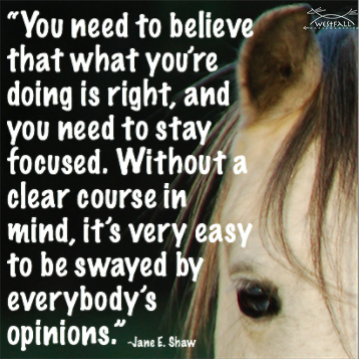
FREE PDF DOWNLOAD
WHY IS MY HORSE...?
100% Private - 0% Spam
No one taught you the skills you need to work through these things.
Riders often encounter self-doubt, fear, anxiety, frustration, and other challenging emotions at the barn. The emotions coursing through your body can add clarity, or can make your cues indistinguishable for your horse.
Learning these skills and begin communicating clearly with your horse.
Click here to learn more.


[…] Quote and Photo from Stacy Westfall’s Blog […]
Stacy, your helping keep the course clear.
I so agree. When my daughter’s horse was 3 1/2 years old, he started doing a sort of pop-up. My daughter, young though she was, knew instinctively that he did not want anyone on his back. We had to go from riding him in lessons to hand walking him. Then, he was fine. Still, something changed. We were newbies, so we asked our barn owner/trainer to put him in training for a while. We figured maybe he was too young? One day we came out to watch a training session. We were shocked! The trainer had other people watching to see what a “mean” horse looked like. What?? As we watched, we noticed that he was moving sideways–fine, if you wanted him to, but that wasn’t what she was asking. She started screaming that our horse was trying to kill her! We knew right then and there (after all the material I’d read about horse’s and horse nature) that there was something else going on with him. We KNEW he wasn’t trying to kill anyone! We contacted another trainer to take us out of there. As soon as she got on him the first time, she sensed he was sick. She called the vet, who did a clinical test, then a blood test. He confirmed it: our daughter’s horse had EPM. After 8 weeks of treatment (Marquis), he seemed good as new. Our new trainer re-trained him, and today he is the most awesome horse (at age 12) ever! We have had many offers to buy him over the years, but he is family and we can’t let him go. Instead, at the tender age of 62, I took up riding because our daughter is away at college. Oh, the first trainer? She’s in jail! So I think people should frequently go with their gut instincts: if it walks like a duck and quacks like a duck, it’s probably a duck! Even uneducated and untrained, we suspected something was wrong (definitely with the trainer and possibly with our horse). We stuck to it and moved our horse because we didn’t get the proper answer from the original barn owner/trainer. Had we let her convince us that he was crazy instead of sick, a good horse could have lost his life. Trust your instincts: in the same way you can often tell whether your child is sick or just crabby, you can tell whether your horse is really ill–don’t let anyone tell you differently. Keep trying to find the cause. Marilyn
Exceedingly timely, thanks!